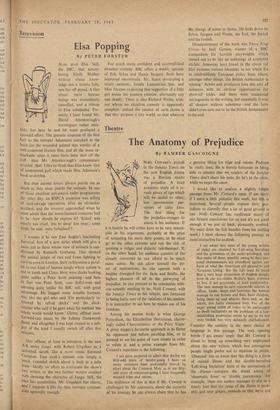Television
Elsa Popping
By PETER FORSTER ALAS, poor Elsa. Still, the BBC, that nature- loving Earth Mother without whose know- ledge not a lioness falls, saw her off proud. A film about mere human beings was immediately cancelled, and a tribute to Elsa substituted. For- merly I have found Mr.
David Attenborough's travelogues rather resis- tible, but here he and his team produced a splendid effort. The genuine suspense of the first half as the intrepid Adamsons searched in the bush for the wounded animal was worthy of a well-contrived feature film, and all the more re- markable since it must have been shot off- the cuff. Also Mr. Attenborough's commentary avoided that I-like-to-think-that-Elsa-knew line of sentimental guff which made Mrs. Adamson's book so cloying.
But then animal lovers always puzzle me as much as they must puzzle the animals. In one of those excellent pot-pourri radio programmes the other day, an RSPCA Inspector was telling of bird-salvage operations after an oil-tanker accident, and the moment approached when he must admit that the worst-harmed creatures had to be—how should he express it? 'Killed' was clearly too cruel, 'put to sleep' too twee some birds, he said, were 'lethalised'!
I wonder if he saw East Anglia's fascinating Stu-viva!, first of a new series which will give a nasty jolt to those whose view of animals is con- ditioned by Kenneth Grahame. This showed the animal jungle of rats and foxes fighting to survive even in London, their ruthlessness a paral- lel to our kind of human jungle where nature is red in tooth and Clore. Here were ducks looking quite unlike a Peter Scott painting—and here in fact was Peter Scott, guns duffel-coat and seeming quite unlike his BBC self, with great advantage. He bagged some notable humans, ton, like the girl who said 'I'm particularly in- terested by tufted ducks' and the duck- catcher who said if he gave away his method 'the
whole world would know.' Clever, offbeat cool- for-wild-cats music by the Johnny Dankworth
Band, and altogether I was kept riveted to a sub- ject of the kind I usually switch off after five minutes.
Also offbeat, at least in intention, is the new A-R series Jung°, with Robert Urquhart as a screwball sleuth, like a more comic Edmund Campion. Last week's episode was simply a small, extended sketch about a theft in a tube train -hardly an effort to overstrain the show's two writers or the two further writers credited with devising the character of Jango. Still, the idea has possibilities, Mr. Urquhart has charm, and I suppose it fills the time between commer- cials agreeably enough.
For much more confident and accomplished situation comedy, BBC offers a weekly episode of Eric Sykes and Hattie Jacques. Both have improved enormously, Mr. Sykes developing a nicely. sardonic, faintly Lancastrian line, and Miss Jacques exploiting that suggestion of a little girl inside the massive exterior, alternately coy and deadly. There is also Richard Wattis, with- out whom no situation comedy is apparently complete—indeed the essence of such shows is that they propose a tiny world, so that whatever the change of scene or theme, life boils down to Sykes, Jacques and Wattis, the fool, the fooled and the foolish.
Disappointment of the week was Three Ring Circus by Jack Gerson, winner of a BBC competition for Scottish playwrights, which turned out to be like an anthology of symbolist clichds. Amnesiac hero found in the circus (of life) assumes various identities to see which fits in unidentifiable European police State where, amongst other things, 'the British Ambassador is missing.' Actors and producers love this sort of nonsense with its obvious opportunities for show-off tricks, and there were occasional astringencies in the writing, but essentially it Was all shadow without substance—and the hero didn't even turn out to be the British Ambassador in the end.










































 Previous page
Previous page